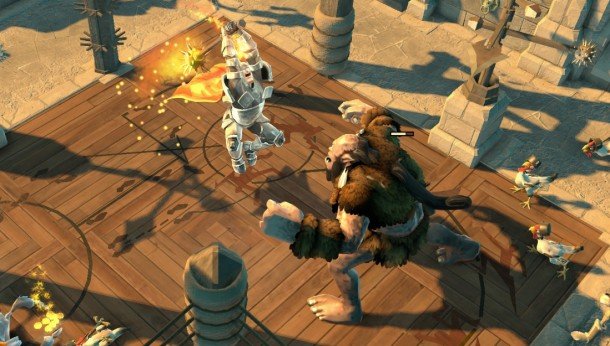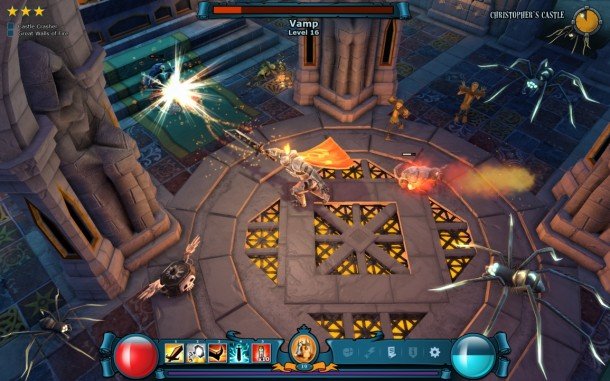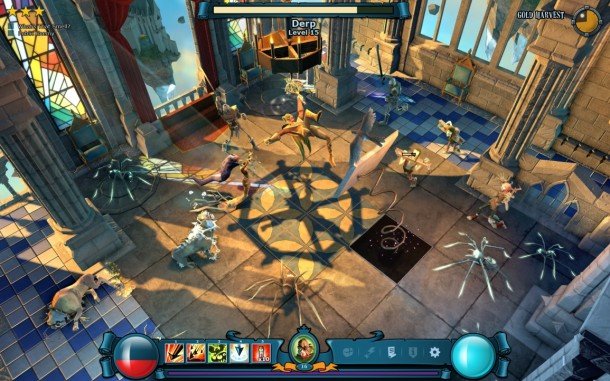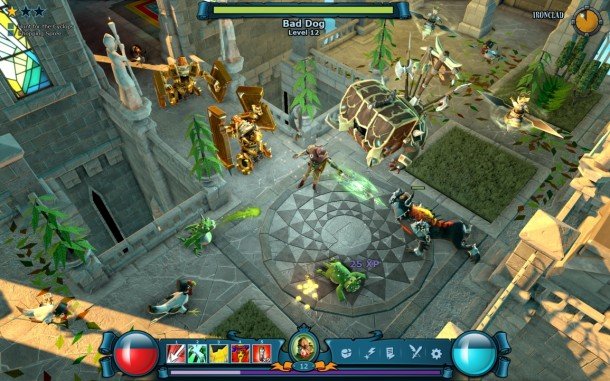
Article by Grant Howitt
Make a castle and raid the castles of other people. That's the core of Ubisoft's free-to-play game: a neat loop that leads you back and forth between Diablo-style dungeon crawler and tower-defence dungeon master. Herded into a Parisian basement and pitched against 15 other journalists, I've had two hours to test the moreish efficacy of this feedback system and I can say that it works - at least in short bursts.
You wake up, put on your armour and survey the massed ranks of floating castles from your very own floating castle, hovering in the endless skies of the land of Opulencia. You find one you like and attempt to kick the snot out of everything inside. If you get through unscathed, you scoop up XP and armfuls of gold, which you can spend on making your own castle better, filling it with traps and monsters to challenge other players. If you're defeated, you earn less, and the owner earns XP and gold for themselves. Rinse and repeat.

Taking control of the heroes - every player has access to all three, and they level up as you use each one individually - is straightforward enough. There's a Knight who acts as a tank, an Archer who acts as an Archer, and a Mage which wasn't available for play. Presumably he works much as you might imagine; MQFEL isn't reinventing the click-and-kill wheel.
"MQFEL isn't reinventing the click-and-kill wheel."
I glance up at the leaderboard. I am third. This is good. I get raiding again. It's only after half an hour of knocking through dungeons that I take a poke around my castle and try to improve it.
Building your castle's defences is easy to get the hang of, and much of the joy comes from exploiting the relative powers of level-appropriate monsters and traps. Guarding your ranged guys with a heavily-armoured protect unit is basic tactics - guarding them with a unit that inflicts knockback and putting a hero-slowing glue trap in a narrow passage in front of them is something else entirely.

I build a final room with a pair of hamster-driven rail-mounted death wheels coupled with a giant ram who will hopefully push heroes into them. I am devious, I think. I check the leaderboard. I'm eighth, suddenly.
The biggest gaming news, reviews and hardware deals
Keep up to date with the most important stories and the best deals, as picked by the PC Gamer team.
"I build a final room with a pair of hamster-driven rail-mounted death wheels."
At this stage, it certainly feels like more of an RTS than a dungeon crawler; there's the satisfaction in squeezing the most power from the cheapest collection of materials, the mastery of unit placement, the sense that if anyone was ever wearing gloves at any stage of the process they are now definitely off and playing fair is playing as hard as you can.
And that's a strange thing to reconcile because the main game - the hacking and slashing, armfuls of gold bit - is so much fun. The colours are bright. The voice acting is charming. The animation is top-notch. The monsters are named things like Snotters and Defend-o-Trons and Hungerbots. It's funny, too, in an eager hit-and-miss kind of way. It seems weird to throw all that against the sort of gameplay where you're required to eke the absolute best from your meagre resources, occasionally resorting to cheap tactics, in order to succeed. Maybe it's a longevity thing, a spoonful of sugar to help the spite go down.

Fifteen minutes later, I'm twelfth. I'm not sure what I'm doing wrong. I watch a replay of someone raiding my dungeon - you get a replay whenever someone has a go at your castle - and he blitzes through it, shooting my monsters at extreme range before they can hurt him. I watch as he approaches my final room, the Deathwheel Ram Cocktail as I'm calling it, and outmanoeuvres everything with ease. To hell with him. I trash the whole thing and jam in as many Cyclopes as I can a) afford and b) fit.
"It's difficult to police the feelings of unfairness that arise from freemium competitive games, but the devs are having a shot."
Gold is the lifeblood of MQFEL - it's used to buy weapons, armour, monsters, traps, potions and, vitally, skills. The payment model kicks in when you're - as the devs say - interested in progressing faster. Gems can be purchased with real-world money and exchanged for certain goods, but it seems like Ubi have been careful not to make it pay-to-win; most of the Gem purchases are monsters or traps, not character upgrades. It's always going to be difficult to police the feelings of unfairness that arise from freemium competitive games, but it seems like the devs are having a shot at it; even if effective monsters are a way to gain more gold and XP, they're no substitute for strapping on your boots and going raiding.
I'm thirteenth when the event ends. I was worth so little in terms of XP gain that no-one bothered raiding my dungeon, eventually. I'm not sure whether I'd rush back to play MFQEL when it's released - "Summer 2013" is the current estimated release date - but there's a lot of charm here, and certainly the potential to offer bite-sized browser-based shots of enjoyment, even if I can't see myself striving to hit the level cap faster than my mates.
PC Gamer is the global authority on PC games—starting in 1993 with the magazine, and then in 2010 with this website you're currently reading. We have writers across the US, Canada, UK and Australia, who you can read about here.


